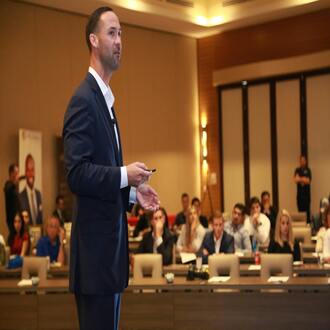Transcription Get feedback from your customers
During the development of this guide we will be addressing the issue of feedback when relating to our clients, to obtain the information we need in order to refine and adapt our strategies towards them. Feedback in the development of our interpersonal and professional relationships plays an essential role in the way we are able to help others and be more accurate in our recommendations.
That is why, taking into account the significance that feedback has for the development of every coach, we will dedicate the following analysis to some basic aspects that revolve around it.
What is feedback?
Feedback is a skill of great impact when it comes to obtaining valuable information from our clients, which allows us to acquire essential knowledge to adapt our strategies and make them more effective for the satisfaction of the client's interests.
Feedback is carried out through the communicative exchange with another person, to whom we will send a message and ask him/her to share his/her impressions and opinions about it. Applying this strategy demands from the coach a certain development of his communicative skills, since it is required to generate a conversation on the plane of equality, which provides the necessary space for the client to express himself with total freedom.
Considering the client's vision
Once we have started our coaching session, we should focus on knowing and identifying what the client's view is on each of the points we are addressing. The best way to get good feedback during the session is to allow our client to express himself with complete confidence and share his views on how he would act in a given circumstance.
If the client comes to you for recommendations on a particular issue, you should state your point of view from your personal experience, but not prevent the client from sharing his or her own. This allows you to consider the options for action from a more open plane, where it is likely that you will be able to incorporate some actions proposed by the client and that adapt to the most accurate solution.
When you incorporate aspects that have been identified by the client, a proposal for action is configured that will be more accessible to the client's personal characteristics. In this way, more adaptable strategies are developed without neglecting the essential aspects that shape their degree of effectiveness and impact.
Plan together with your client
Many coaches make the mistake of offering solutions and strategies based on their personal and professional experience. While it is true that the fundamental reason why the coach is requested and hired by his client is because he has superior knowledge on how to deal with certain situations, this does not mean that the client cannot discover his potential and contribute great ideas when planning the steps to follow and the solutions to the different problems.
From the coach's experience and the client's vision, much more complete and effective ideas can be generated. You should not underestimate the vision that the client may have, nor act with airs of superiority that leads to harm the interests of the person who hires us for their benefit. Work together with your client and be a support for him, but allow him to be part of the solutions by contributing his ideas, approaches and perspective on each specific issue.
Educating the client is not about telling them what to do and how to do it. The idea is that the coach interacts through self-discovery sessions, which help to awaken the client's hidden potential.
feedback customers




